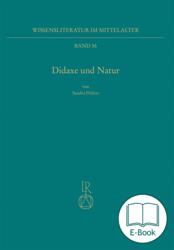Using vernacular examples from ‘didactic literature’, it is questioned which role the verbalisation of nature plays in a didactic context and which knowledge systems come together in its textualisation. The work demonstrates how talking about nature enables a dynamic amalgamation of various discourses and thereby itself produces both knowledge and reality. At the same time, the text analyses make clear that – despite all the variance and variety – certain structures become recognisable, appearing as a recurring combination of particular discourse combinations with distinct textualisation strategies.
By virtue of a shift in the perception of nature, notably influenced by an increasing reception of Aristotle in the medieval West, the 13th century can be described as a period of transition. To put it simply, in addition to understanding natural elements as signs to be interpreted in regard to the history of salvation, the perception of nature can also be characterised by a growing ‘empiricism’. At the same time, the 13th century is a time that is influenced by a rise in vernacular literature, and in particular, by an increased emergence of didactic literature. This is exactly where the study positions itself, asking about the literary representation of nature and its instrumentalisation for the dissemination of knowledge. On the one hand, the analysis is about the various textualisation strategies with which nature is verbalised, and on the other hand, it considers the matter of knowledge systems which come together in its textualisation. Talking about nature is thus understood as a practice that allows for a dynamic amalgamation of various discourses and thereby itself produces both knowledge and reality. The study, at the same time, also poses the overarching question of what space literature can offer to orchestrate, alter or even enable speaking and thinking about nature in the first place.
A considerable didactic work from the late 13th century, Hugo von Trimberg’s ‘Renner’ is the focus of the analysis; for comparison, two further examples of ‘didactic literature’ are included: Thomasin von Zerklaere’s ‘Welsche Gast’ and Freidank’s ‘Bescheidenheit’.
The text analyses make clear that – despite all the variance and variety – certain structures become recognisable, appearing as a recurring combination of particular discourse combinations with distinct textualisation strategies. It thus becomes apparent that the role of nature does not simply follow the triad of figurative speech, presentiveness and instruction. With its textualization, the gaze can be led through nature to the Creator or – as if reflected from a mirror – thrown back on the recipient; at the same time, the gaze is repeatedly directed towards nature itself and its elements, such as animals and plants. Through language, images of nature can be conceived and a perception of (extra-literary) nature can be formed. Moreover, by integrating references to nature within the space of literature, the functionalities of language and knowledge dissemination themselves can be thematised.
Born in 1990 – Education: Business Administration at the Berlin School of Economics and Law (BA), Cultural Studies and German Literature at the Humboldt University of Berlin (BA), German Literature with a Focus on Medieval Literature at the Freie Universität Berlin (MA), PhD in German Studies as a Member of the Research Training Group 1876 ‘Early Concepts of Humans and Nature: Universal, Specific, Interchanged’ at the Johannes Gutenberg University Mainz – Subject-related professional activities: during studies, employed at the Research Centre for the Middle Ages at the Berlin-Brandenburg Academy of Sciences and Humanities, during PhD, worked as a research assistant in the Research Training Group 1876, since 2018, employed as a recurring lecturer at Goethe University Frankfurt am Main, since 2020, has been a research assistant in the DFG-funded project ‘Lyrics of the German High Middle Ages: A Digital Edition of Minnesang’ at the Friedrich-Alexander-Unitersität Erlangen-Nürnberg (
https://www.germanistik.phil.fau.de/person/hofert-sandra/) – Research focus: animal studies, material culture (in literature presented objects and the materiality of tradition), literature as cultural studies, didactic literature, discourse analysis, classical and late courtly romances, ‘Sangspruchdichtung’ and ‘Meistersang’.


 Sample
Sample